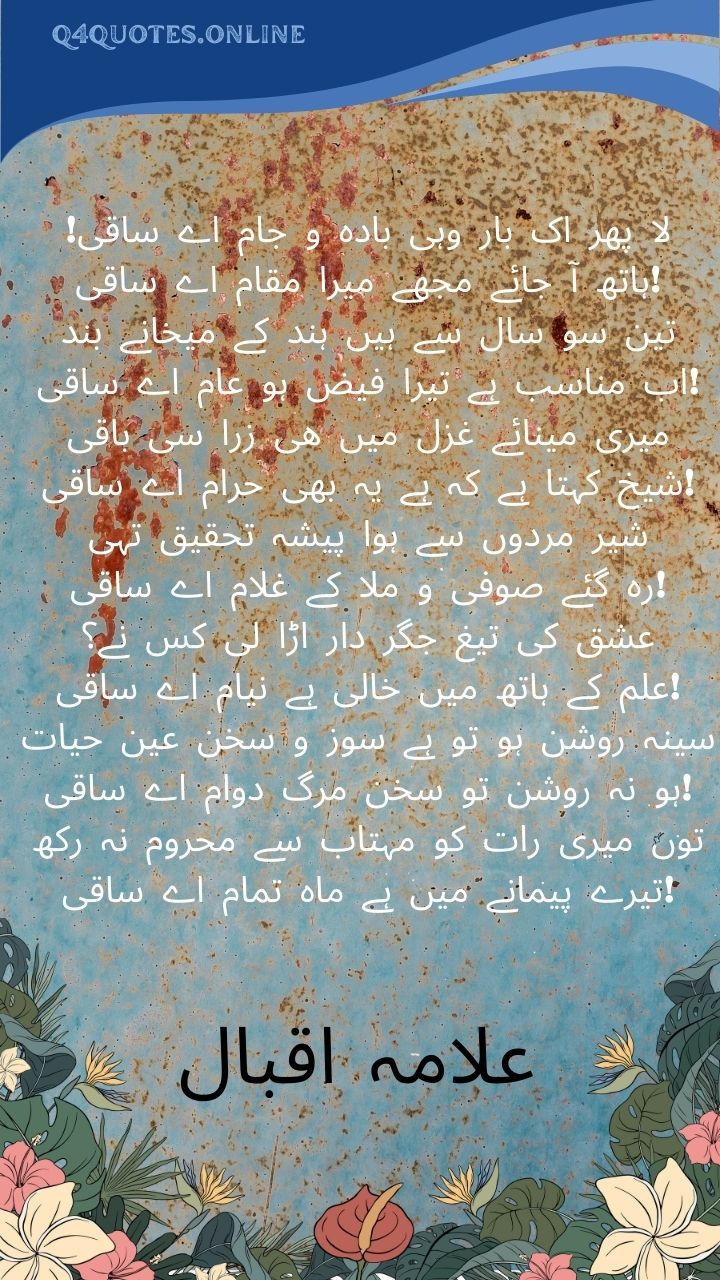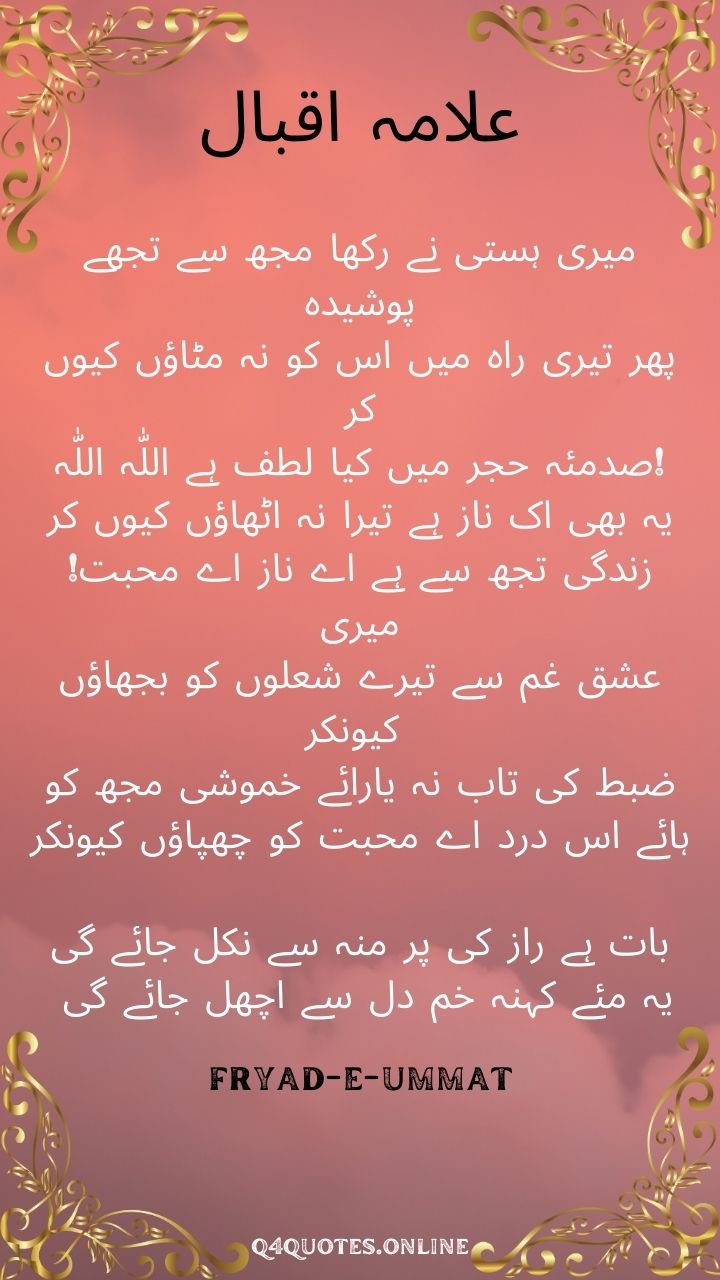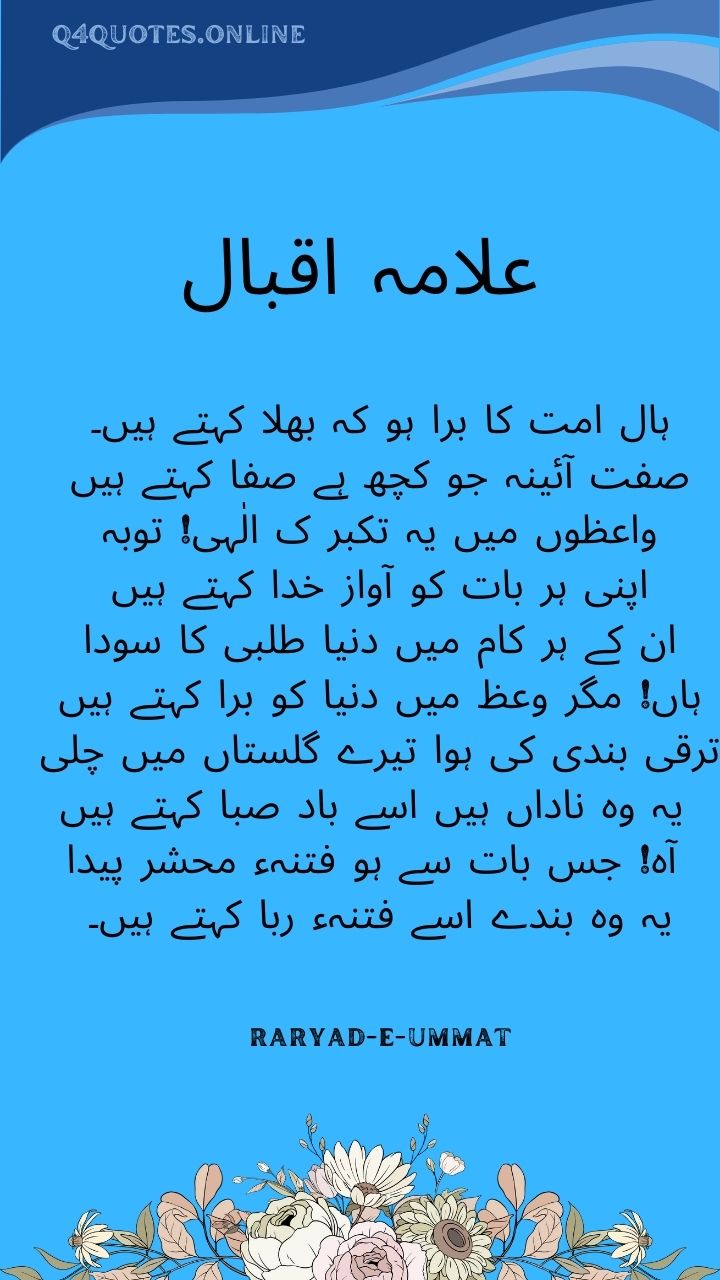Discover the depth of Allama Iqbal poetry in Urdu, reflecting on his intellectual vision, philosophical insights, and timeless critique of societal challenges. Explore both positive and critical perspectives in this comprehensive analysis of his works.
Exploring the Depths of Allama Iqbal Poetry in Urdu
Allama Iqbal, one of the most prominent philosophers, poets, and thinkers of the 20th century, revolutionized Urdu poetry with his profound ideas. His verses are a beautiful combination of spirituality, social criticism, and intellectual exploration, making Allama Iqbal poetry in Urdu a cornerstone of modern Urdu literature. His work continues to inspire not only Pakistanis but also the entire Muslim world, urging self-awareness, revival of Muslim heritage, and intellectual freedom.
This blog delves into the positive and negative aspects of Allama Iqbal’s poetry, with a particular focus on how his thoughts resonate with contemporary issues.
The Philosophical Foundation of Allama Iqbal Poetry in Urdu
At the heart of Allama Iqbal poetry in Urdu is his philosophy, which is deeply influenced by Islamic mysticism, Western philosophy, and his profound understanding of Persian and Urdu literature. Iqbal’s poetry is not merely an emotional outpouring but rather an intellectual exercise. He viewed poetry as a means to awaken the slumbering souls of his people, as reflected in his famous line:
“خودی کو کر بلند اتنا کہ ہر تقدیر سے پہلے
خدا بندے سے خود پوچھے، بتا تیری رضا کیا ہے”
This verse encourages self-realization and the belief that man has the potential to shape his destiny through personal development, which is central to his philosophical framework.

لا پھر اک بار وہی بادہ و جام اے ساقی!
ہاتھ آ جائے مجھے میرا مقام اے ساقی!
تین سو سال سے ہیں ہند کے میخانے بند
اب مناسب ہے تیرا فیض ہو عام اے ساقی!
میری مینائے غزل میں ھی زرا سی باقی
شیخ کہتا ہے کہ ہے یہ بھی حرام اے ساقی!
شیر مردوں سے ہوا پیشہ تحقیق تہی
رہ گئے صوفی و ملا کے غلام اے ساقی!
عشق کی تیغ جگر دار اڑا لی کس نے؟
علم کے ہاتھ میں خالی ہے نیام اے ساقی!
سینہ روشن ہو تو ہے سوز و سخن عین حیات
ہو نہ روشن تو سخن مرگ دوام اے ساقی!
توں میری رات کو مہتاب سے محروم نہ رکھ
تیرے پیمانے میں ہے ماہ تمام اے ساقی!
علامہ اقبال
Positives of Allama Iqbal Poetry in Urdu: Awakening the Ummah
The positive influence of Allama Iqbal poetry in Urdu cannot be overstated. His works inspire a deep sense of awakening among Muslims, encouraging them to rise above stagnation and seek progress. Poems like “Shikwa” and “Jawab-e-Shikwa” serve as examples of how he invokes the past glory of the Muslim civilization while simultaneously encouraging his audience to rebuild that legacy.
- Awakening the Self: Iqbal emphasizes the importance of self-awareness and the nurturing of individual potential. This concept, known as “Khudi” (selfhood), forms the backbone of his work. It encourages individuals to strive for greatness through faith, determination, and hard work.
- A Call for Intellectual Freedom: Allama Iqbal poetry in Urdu frequently calls for intellectual independence and breaking free from mental slavery. He criticizes blind imitation of Western values, urging Muslims to cultivate their own identity rooted in Islamic traditions. His lines like “پرواز ہے دونوں کی اسی ایک فضا میں
کرگس کا جہاں اور ہے، شاہین کا جہاں اور” speak to the difference between those who aim low and those who soar with ambition and vision. - Revival of Muslim Heritage: Through his poetry, Iqbal constantly reminds Muslims of their rich history. His works rekindle the desire for cultural and scientific advancements, motivating his readers to reclaim the lost grandeur of the Islamic world.
Criticism of Allama Iqbal Poetry in Urdu: Between Idealism and Realism
While the positive aspects of Allama Iqbal poetry in Urdu are undeniable, some critiques arise when we consider his idealism and approach toward societal challenges. Certain negative perspectives focus on how Iqbal’s vision sometimes appears detached from the realities of his time, particularly when addressing the masses.
Negatives: The Complexity of Iqbal’s Vision
- Overly Idealistic: Critics often argue that Allama Iqbal poetry in Urdu can be overly idealistic. His concepts of self-realization and spiritual revival, while inspiring, may seem too abstract for the common man. Many find it challenging to translate his poetic wisdom into practical steps in daily life. For example, his call to rise above worldly concerns may seem impractical in the face of real-world challenges like poverty, political instability, and colonial subjugation.
- Elitism in Thought: Some also argue that Iqbal’s focus on spiritual and intellectual advancement is tailored more toward the educated elite rather than the general public. His use of complex philosophical themes often requires deep contemplation, which may not be accessible to everyone. This leads to the critique that his poetry, although universal in its message, caters to a limited audience.
- Over-Reliance on Islamic Identity: Another criticism focuses on his emphasis on Islamic identity. While Allama Iqbal poetry in Urdu celebrates the Muslim past and advocates for the revival of Islamic principles, some believe it leaves little room for pluralism in a diverse world. His poems, though aimed at uplifting Muslims, sometimes do not fully embrace the complexities of multi-religious and multi-cultural societies.

میری ہستی نے رکھا مجھ سے تجھے پوشیدہ
پھر تیری راہ میں اس کو نہ مٹاؤں کیوں کر
صدمئہ حجر میں کیا لطف ہے اللّٰہ اللّٰہ!
یہ بھی اک ناز ہے تیرا نہ اٹھاؤں کیوں کر
زندگی تجھ سے ہے اے ناز اے محبت! میری
عشق غم سے تیرے شعلوں کو بجھاؤں کیونکر
ضبط کی تاب نہ یارائے خموشی مجھ کو
ہائے اس درد اے محبت کو چھپاؤں کیونکربات ہے راز کی پر منہ سے نکل جائے گی
یہ مئے کہنہ خم دل سے اچھل جائے گیعلامہ اقبال
Allama Iqbal’s Critique of Society: Balancing Positives and Negatives
One of the most compelling aspects of Allama Iqbal poetry in Urdu is his sharp critique of the societal structures around him. His poetic critiques of religious hypocrisy, intellectual stagnation, and political disillusionment resonate strongly even today.
Positive Social Critique
Iqbal’s poetry is a powerful commentary on the religious leaders of his time, whom he saw as more concerned with ritual than with genuine spiritual growth. He famously said:
“واعظوں میں یہ تکبر ک الٰہی! توبہ
اپنی ہر بات کو آواز خدا کہتے ہیں”
In this verse, he calls out the arrogance of the clergy who speak as though their words are divine. This criticism reflects his dissatisfaction with the religious scholars who, in his view, had lost the essence of true faith.
Iqbal also critiques the societal elite who chase after material wealth while decrying the same in their sermons. His poetry serves as a wake-up call to both religious and political leaders to realign their actions with their professed values.
Negative Critique: Detachment from Ground Realities
On the flip side, some critics believe that Allama Iqbal poetry in Urdu fails to offer practical solutions for the issues it critiques. While Iqbal encourages action and intellectual freedom, he doesn’t always provide a clear roadmap for societal change. His vision, though profound, can sometimes feel removed from the day-to-day struggles of the common people, leaving a gap between his ideals and their application.
For example, his emphasis on individual self-realization may inspire personal growth but may not directly address collective social or economic reforms. This has led some to question how effective his poetry can be in creating tangible change.

ہال امت کا برا ہو کہ بھلا کہتے ہیں۔
صفت آئینہ جو کچھ ہے صفا کہتے ہیں
واعظوں میں یہ تکبر ک الٰہی! توبہ
اپنی ہر بات کو آواز خدا کہتے ہیں
ان کے ہر کام میں دنیا طلبی کا سودا
ہاں! مگر وعظ میں دنیا کو برا کہتے ہیں
ترقی بندی کی ہوا تیرے گلستاں میں چلی
یہ وہ ناداں ہیں اسے باد صبا کہتے ہیں
آہ! جس بات سے ہو فتنہء محشر پیدا
یہ وہ بندے اسے فتنہء ربا کہتے ہیں
علامہ اقبال
If you want a read about TEHZEEB HAFI click here
Legacy of Allama Iqbal Poetry in Urdu: A Timeless Treasure
Despite some criticisms, the positive influence of Allama Iqbal poetry in Urdu far outweighs the negatives. His works remain a timeless treasure, continuously inspiring generations of thinkers, leaders, and ordinary people alike. His poetry transcends the boundaries of time and space, offering a vision of life that is as relevant today as it was in his own time.
Iqbal’s legacy lies not only in the beauty of his verses but in the depth of his thoughts, which encourage a balance between faith and reason, spirituality and action. His poetry continues to resonate with those who seek not only personal fulfillment but also societal transformation.
In conclusion, Allama Iqbal poetry in Urdu is a unique blend of spiritual wisdom, intellectual rigor, and social critique. Whether through his emphasis on self-realization or his call for societal reform, Iqbal’s verses remain a powerful force in shaping the minds of those who engage with them. While his work is not without its challenges and critiques, the overarching message of hope, revival, and awakening makes Allama Iqbal one of the most influential poets in the Urdu language.
